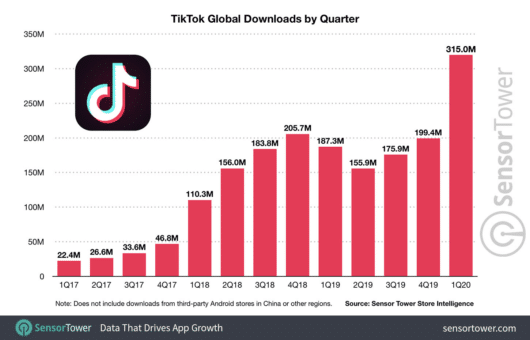The rise of TIKTOK
Author: Winona Fischer
Estimated reading time: 7 min
Tired of reading? Let our lovely AI Amy read it for you:
Today’s relevance
Probably most of people have heard of the app Tik Tok by now. The short-form video app, has gained lots of popularity over the last months. Especially the Covid-19 Pandemic has pushed the popularity especially even for other generations like Millenials a lot. TikTok is owned by a chinese company called “ByteDance” and already has had more than 1 billion downloads throughout its existence. As of now it probably is the most famous app for teenagers these days. Astonishingly the chinese app already ranked No.1 in non-gaming apps in iOS app stores in september 2019 in the United States of America (Leskin, 2019) and also is the most downloaded app in 2020 so far.
But what’s the big fuzz about Tik Tok? Why is it one of the most successful social apps for teenagers these days – what is generation Z as a consumer like? And furthermore of course what potential does Tik Tok have for advertisers and marketers, especially looking at the fact that the chinese company is just about to start its Tik Tok for business tool in Germany, starting with the 15th of July. Answers to these questions and some explanation and insights on the whole Tik Tok phenomena will be giving here.
Origins and recent developments
TikTok was originally founded by Zhang Yiming, the chinese founder of the company Bytedance back in 2016. Bytedance itself was founded in 2012 and is as of today the most valuable startup according to Bloomberg in May 2020. With the parents company being headquartered in Beijing, the HQ of Tik Tok is now in Los Angeles, California (Rogers, 2019).
In 2017 the company acquired Musical.ly, which was another short-video platform from China for up to $1 billion. Roughly a year later Musical.ly was then renamed and redesigned to TikTok. Back in China the app is known as “Douyin” and is technically separate but works in the same way.
Although it was a risky step to rename and redesign the successful app back then it did not turn out negatively for the chinese company. Even elsewise, the broader content creation possibilities even pushed TikTok further especially among younger generations, who apparently love lip syncing and dancing videos primarily.
Eversince Tik Tok has been on the fast lane in terms of app downloads and unique users. By July 6th 2020, Tik Tok has had over 6.1 million downloads on android and iOS devices in Germany (Brandt, 2020).
The greatest Market for them still is India with more than 100 million downloads. The chinese version Doujin overall is the largest market for them in terms of revenue with 72.3% of the total revenue. (CNBC, 2020)
Probably most of people have heard of the app Tik Tok by now. The short-form video app, has gained lots of popularity over the last months. Especially the Covid-19 Pandemic has pushed the popularity especially even for other generations like Millenials a lot. TikTok is owned by a chinese company called “ByteDance” and already has had more than 1 billion downloads throughout its existence. As of now it probably is the most famous app for teenagers these days. Astonishingly the chinese app already ranked No.1 in non-gaming apps in iOS app stores in september 2019 in the United States of America (Leskin, 2019) and also is the most downloaded app in 2020 so far.
But what’s the big fuzz about Tik Tok? Why is it one of the most successful social apps for teenagers these days – what is generation Z as a consumer like? And furthermore of course what potential does Tik Tok have for advertisers and marketers, especially looking at the fact that the chinese company is just about to start its Tik Tok for business tool in Germany, starting with the 15th of July. Answers to these questions and some explanation and insights on the whole Tik Tok phenomena will be giving here.
Generation Z
Considering a couple of facts first before focusing on a specific target group when talking about Tik Tok makes things very clear then. In october 2019 a paper made for advertisers in US leaked to media and to the public. Usually Tik Tok pretty much keeps there usage numbers and consumers characteristics quite for themselves. But according to this paper some quite likely facts got through. 69% of all Tik Tok users are in between 16 and 24 years old, and only roughly about 31% are older than 25 years. In addition to that only 15% of the users are older than 35 years. (T3N, 2019)
Looking at these obvious facts Tik Tok definitely is a huge phenomena for the so called Generation Z or Gen Z.
Gen Z are usually all people born in between 1995 and 2010, therefore following up the Millennial generation. The Gen Z are right know roughly about 10% of the population and are most likely to become one of the most important customer groups on the market.
They differ to their prior generation in many different terms. The Gen Z generations are pretty much the true digital natives. Ever since they were born, they have always had the internet and mostly social networks. Apart from this the Gen Z generation is more about diversity and multiculturalism. Within the global and dynamic connected world we live in individualism is something they really like to focus on. It is okay not be perfect, and they really like to keep things more realistically and in just the way things are or just the way people truly are, not being interested in faking anything. Being different usually is a good thing and highly appreciated, also seeing deeper meanings in work as they group up although it says that the Gen Z is more likely to enjoy structured work again than the flexibility lovers from the millennials generation. Most of these things are indicating why Tik Tok is so successful in this generation. People are liked and followed for being different, funny or honest to their social network (Criteo, 2018).
The Tik Tok algorithm actually makes it easier for people to become famous or go viral or go more viral than on instagram for instance. In the #foryou section it randomly shows videos on an ongoing basis which just fits your interests quite well. The algorithm learns what you are most interested in after a while and acts accordingly. Some are even talking about a strategy of Tik Tok which could be compared to a “democratized virality”. Meaning that they do not only show you videos which already are huge or people who have lots of followers but also the ones in your local area for instance and videos with no likes etc. Gen Z likes the fact that therefore everything is more discoverable and its rather fair than Instagram for instance, where in the “inspiring” section mostly just even picture perfect influencers are being showed (Francis/ Hoefel, 2018)
Tik Tok for Business
A different and even more interesting question for marketers and businesses now is – How can they profit from the unique access TikTok has to the Gen Z and what actually is Tik Toks revenue model?
As of now Tik Tok likes to keep things quiet and therefore has not yet revealed a lot about their monetization strategy in the long run. (Chinabrands, 2019)
TikTok is already used by some brands for advertisements, for instance in the beginning when opening the app, an ad can pop up. But also other minor sponsorships have already occured, like hashtag challenges. Fact though is that Tik Tok, especially in the U.S. and in Europe still has ongoing potential to make more profits through advertisements. Their unique stand point for the direct access to Gen Z in a “cool” way is what makes them stand out in comparison to other social media. But so far Tik Tok doesn’t need to worry since their parent company Bytedance is recognised as the most valuable startup with a profit of 3 billion US$ in the year 2019 (Bloomberg, 2020) Just reported in the beginning of this month (July 2020) TikTok released also for the german market that they will start their Tik Tok for Business on the 15th of July. Tik Tok primarily took this step to give companies the possibility to reach different or other customer sections.
Many companies especially small ones have been suffering due to Covid-19, therefore Tik Tok also focuses on its “back-to-business” program, which was initiated to help companies build up again. With this Tik Tok is willing to give advertising credits in a whole sum of 100 million US$, in accordance to official statements on the website. Tik Tok for business in Germany will be operated as a self service platform for a some whitelisted companies in the first couple of months to give it a testing time. But the prior question is, are companies in Germany ready for Gen Z on this platform? This is what also Adil Sbai and Johannes Ruisinger question themselves and therefore started off with the first Tik Tok agency in Hamburg. According to the two founders Tik Tok needs to be treated differently than other social networks. Furthermore they like to stress the fact hat Tik Tok is quite unique, because it is only about videos and no photos, therefore content creators really have to emphasize on storytelling elements in order to get the viewers attention. The Agency already has clients like O2, Beiersdorf or even the Food-startup 3Bears from Munich, which are selling special porridge products online (Weber, 2020).
Apart from all these thriving and positively voices towards Tik Tok, there also many others concerns about the short-video app which have been raised quite a lot recently. Especially looking at regulatory and privacy concerns, because the App is owned by a chinese company. Especially the US government is quite concerned about the data collection operated by a chinese company and this has never occurred before in history that millions of Americans downloaded a chinese app. US politicians see Tik Tok as a threat for national security, although Tik Tok denies any of these accusations and stresses the fact that they apparently only store data of american citizens in the United States (CNN, 2020).
But its not only the US which stated out their big concerns about the new teen hype, also other countries like India, which represents one of the biggest market for TikTok, raise increasingly concerns. In India the government has already banned many chinese apps, even including WeChat and TikTok now. The government accuses these apps of using data illegally and misbusing the consuments data privacy on their phones. (BBC, 2020)
Also in germany concerns have been raised and some experts even recommend to delete the app immediately. (Abendblatt, 2020)
Either being banned or cautious governmental watch by others states, the app will most likely stay as famous for now, because its users mostly see the joy and fun with it. Despite that it will be of an interesting journey what is mostly likely going to happen with the short-video app and how it might also have the potential to influence the digital advertising sphere in a long run, looking at the rising importance of Gen Z.
Reference
Leskin, P. (2019, Sept.). Inside the rise of TikTok (…). Retrieved from https://www.businessinsider.de/international/tiktok-app-online-website-video-sharing-2019-7/?r=US&IR=T
Rogers (2019, November). Meet Zhang Yiming (…). Retrieved from
https:// www.businessinsider.de/international/tiktok-billionaire-zhang-yiming-net-worth-lifestyle-2019-11/?r=US&IR=T
Brand (2020, July). 6.1 Millionen Tik Tok dowloads in Deutschland. Retrieved from
https://de.statista.com/infografik/16904/anzahl-der-tiktok-downloads-auf-android-und-ios-geraete/
Unknown (2020, april). TikTok Crosses 2 Billion Downloads After Best Quarter For Any App Ever. Retrieved from
https:// sensortower.com/blog/tiktok-downloads-2-billion
Unknown – T3N (2019, october). Tik Tok hat weltweit 800 millionen Nutzer. Retrieved from: https://t3n.de/news/tiktok-hat-weltweit-800-millionen-1206404/
Feng (2019, march). World’s Most Valuable Startup Is Home to a Complex Fortune. Retrieved from: https://www.bloomberg.com/news/articles/2019-03-24/the-complex-fortune-growing-inside-world-s-most-valuable-startup
Unkown. Lexikon: Generation Z. Retrieved on:
https:// www.gruenderszene.de/lexikon/begriffe/generation-z?interstitial
Unknown (2018, July). Millennials vs. Generation Z: 4 wesentliche Unterschiede zwischen den Generationen. Retrieved from:
https:// www.criteo.com/de/insights/millennials-vs-gen-z/
Francis, Hoefel (2018, Nov.). True Gen’: Generation Z and its implications for companies. Retrrieved from: https://www.mckinsey.com/industries/consumer-packaged-goods/our-insights/true-gen-generation-z-and-its-implications-for-companies



